University Assignment: Technology in Audit Engagements Report
VerifiedAdded on 2022/11/10
|9
|2176
|304
Report
AI Summary
This report examines the impact of technological advancements on audit engagements, focusing on data analytics, audit support systems, and cognitive technologies (AI). The report begins with an email exchange discussing these technologies and their influence on the audit profession. It then analyzes each technology, highlighting how data analytics tools assist in data extraction, validation, and analysis, supporting audit judgments and program direction. Audit support systems are presented as tools aiding in effective audit engagements through electronic work papers and decision-making support. Cognitive technologies, particularly AI, are discussed as a major technological development, changing how auditors operate by automating processes, reducing bias, and improving communication. The rationale section elaborates on these technologies, emphasizing data analytics' role in improving audit quality and providing insights. Audit support systems are highlighted for their contribution to streamlining audit engagements and ensuring data and information flow. Finally, cognitive technology's role in analyzing unstructured data, improving audit judgments, and increasing efficiency is discussed, concluding that audit support systems would be the most appropriate technology for the firm due to their ability to be tailored to specific needs and support the audit team.
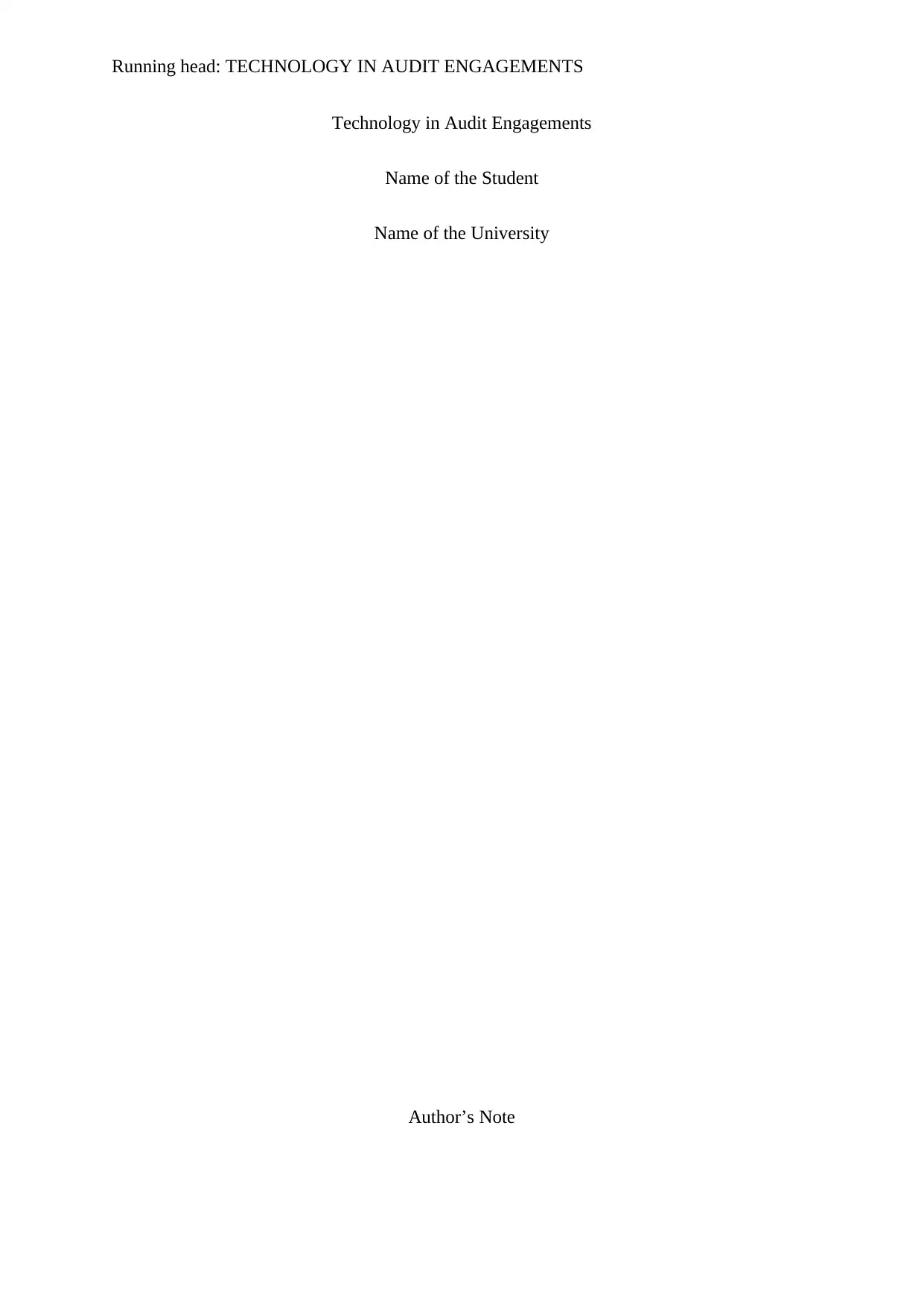
Running head: TECHNOLOGY IN AUDIT ENGAGEMENTS
Technology in Audit Engagements
Name of the Student
Name of the University
Author’s Note
Technology in Audit Engagements
Name of the Student
Name of the University
Author’s Note
Paraphrase This Document
Need a fresh take? Get an instant paraphrase of this document with our AI Paraphraser
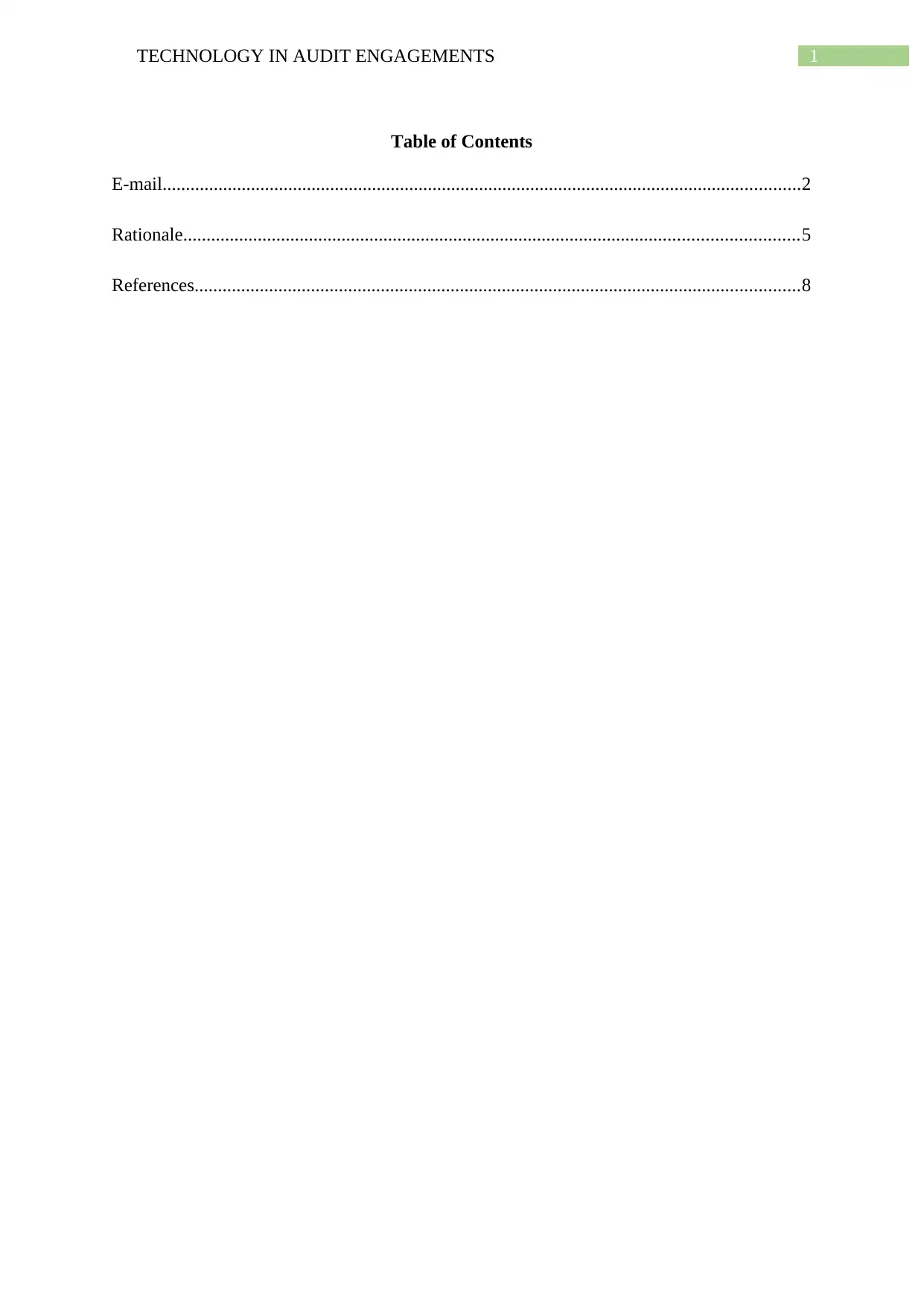
1TECHNOLOGY IN AUDIT ENGAGEMENTS
Table of Contents
E-mail.........................................................................................................................................2
Rationale....................................................................................................................................5
References..................................................................................................................................8
Table of Contents
E-mail.........................................................................................................................................2
Rationale....................................................................................................................................5
References..................................................................................................................................8
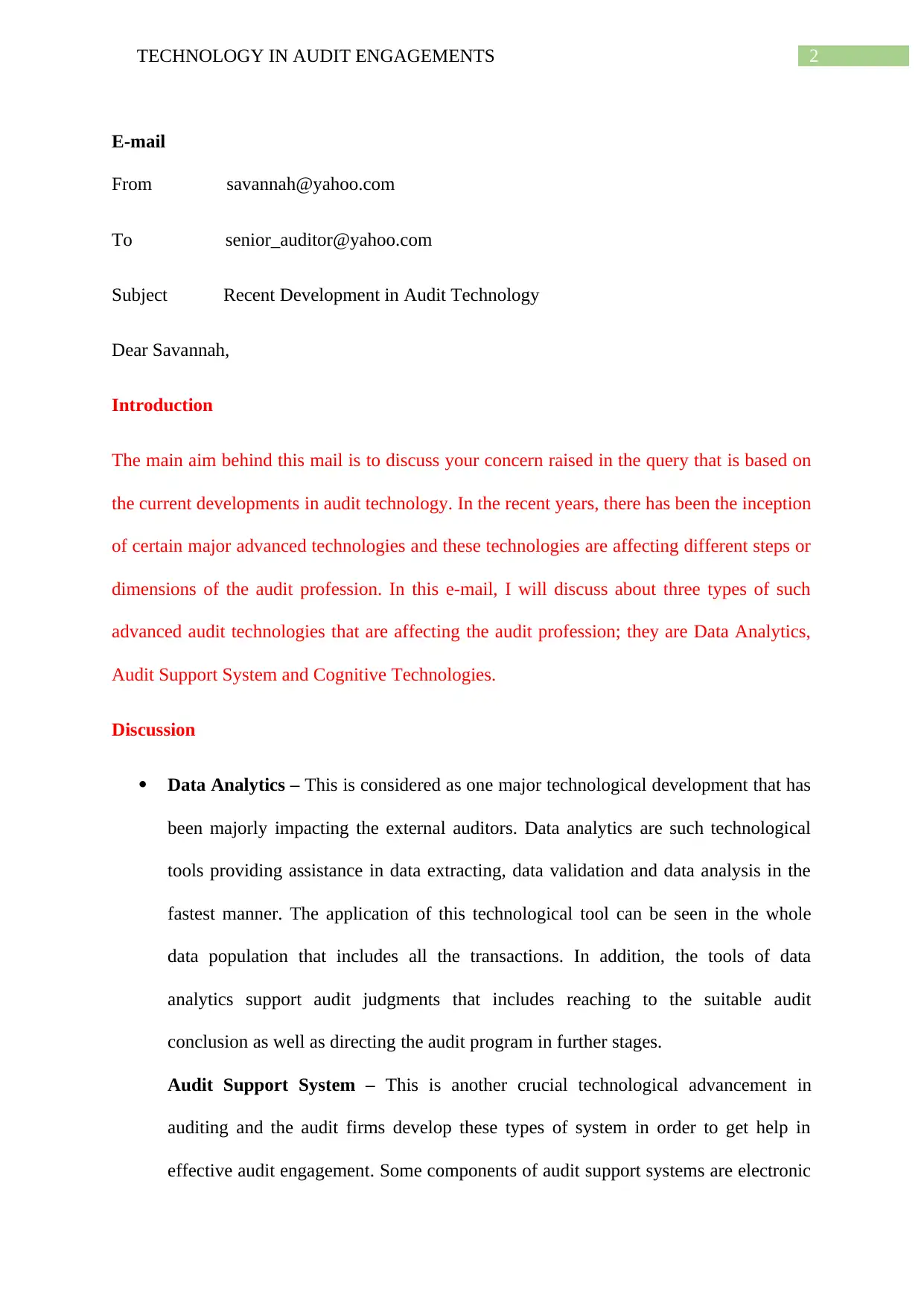
2TECHNOLOGY IN AUDIT ENGAGEMENTS
E-mail
From savannah@yahoo.com
To senior_auditor@yahoo.com
Subject Recent Development in Audit Technology
Dear Savannah,
Introduction
The main aim behind this mail is to discuss your concern raised in the query that is based on
the current developments in audit technology. In the recent years, there has been the inception
of certain major advanced technologies and these technologies are affecting different steps or
dimensions of the audit profession. In this e-mail, I will discuss about three types of such
advanced audit technologies that are affecting the audit profession; they are Data Analytics,
Audit Support System and Cognitive Technologies.
Discussion
Data Analytics – This is considered as one major technological development that has
been majorly impacting the external auditors. Data analytics are such technological
tools providing assistance in data extracting, data validation and data analysis in the
fastest manner. The application of this technological tool can be seen in the whole
data population that includes all the transactions. In addition, the tools of data
analytics support audit judgments that includes reaching to the suitable audit
conclusion as well as directing the audit program in further stages.
Audit Support System – This is another crucial technological advancement in
auditing and the audit firms develop these types of system in order to get help in
effective audit engagement. Some components of audit support systems are electronic
From savannah@yahoo.com
To senior_auditor@yahoo.com
Subject Recent Development in Audit Technology
Dear Savannah,
Introduction
The main aim behind this mail is to discuss your concern raised in the query that is based on
the current developments in audit technology. In the recent years, there has been the inception
of certain major advanced technologies and these technologies are affecting different steps or
dimensions of the audit profession. In this e-mail, I will discuss about three types of such
advanced audit technologies that are affecting the audit profession; they are Data Analytics,
Audit Support System and Cognitive Technologies.
Discussion
Data Analytics – This is considered as one major technological development that has
been majorly impacting the external auditors. Data analytics are such technological
tools providing assistance in data extracting, data validation and data analysis in the
fastest manner. The application of this technological tool can be seen in the whole
data population that includes all the transactions. In addition, the tools of data
analytics support audit judgments that includes reaching to the suitable audit
conclusion as well as directing the audit program in further stages.
Audit Support System – This is another crucial technological advancement in
auditing and the audit firms develop these types of system in order to get help in
effective audit engagement. Some components of audit support systems are electronic
⊘ This is a preview!⊘
Do you want full access?
Subscribe today to unlock all pages.

Trusted by 1+ million students worldwide
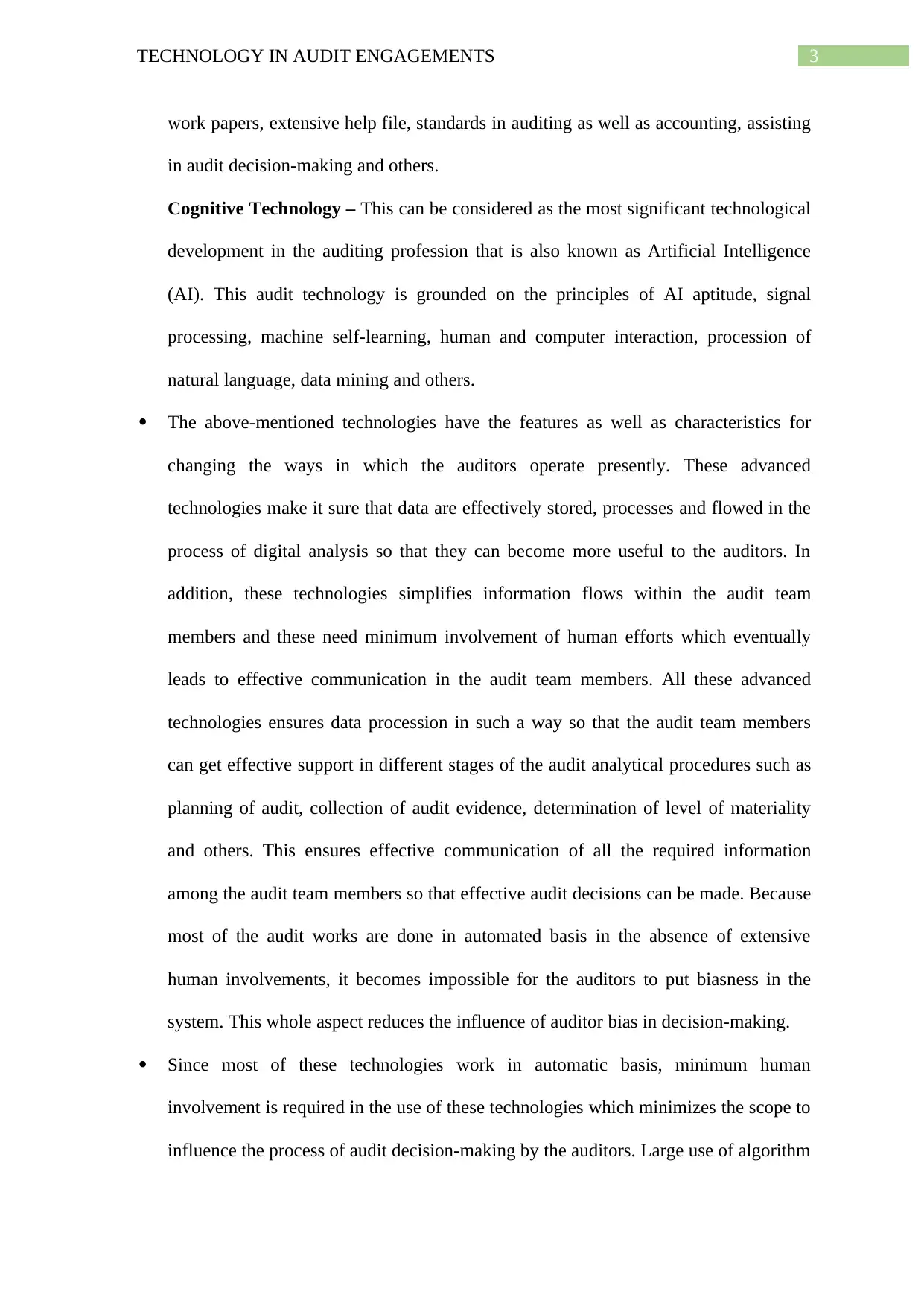
3TECHNOLOGY IN AUDIT ENGAGEMENTS
work papers, extensive help file, standards in auditing as well as accounting, assisting
in audit decision-making and others.
Cognitive Technology – This can be considered as the most significant technological
development in the auditing profession that is also known as Artificial Intelligence
(AI). This audit technology is grounded on the principles of AI aptitude, signal
processing, machine self-learning, human and computer interaction, procession of
natural language, data mining and others.
The above-mentioned technologies have the features as well as characteristics for
changing the ways in which the auditors operate presently. These advanced
technologies make it sure that data are effectively stored, processes and flowed in the
process of digital analysis so that they can become more useful to the auditors. In
addition, these technologies simplifies information flows within the audit team
members and these need minimum involvement of human efforts which eventually
leads to effective communication in the audit team members. All these advanced
technologies ensures data procession in such a way so that the audit team members
can get effective support in different stages of the audit analytical procedures such as
planning of audit, collection of audit evidence, determination of level of materiality
and others. This ensures effective communication of all the required information
among the audit team members so that effective audit decisions can be made. Because
most of the audit works are done in automated basis in the absence of extensive
human involvements, it becomes impossible for the auditors to put biasness in the
system. This whole aspect reduces the influence of auditor bias in decision-making.
Since most of these technologies work in automatic basis, minimum human
involvement is required in the use of these technologies which minimizes the scope to
influence the process of audit decision-making by the auditors. Large use of algorithm
work papers, extensive help file, standards in auditing as well as accounting, assisting
in audit decision-making and others.
Cognitive Technology – This can be considered as the most significant technological
development in the auditing profession that is also known as Artificial Intelligence
(AI). This audit technology is grounded on the principles of AI aptitude, signal
processing, machine self-learning, human and computer interaction, procession of
natural language, data mining and others.
The above-mentioned technologies have the features as well as characteristics for
changing the ways in which the auditors operate presently. These advanced
technologies make it sure that data are effectively stored, processes and flowed in the
process of digital analysis so that they can become more useful to the auditors. In
addition, these technologies simplifies information flows within the audit team
members and these need minimum involvement of human efforts which eventually
leads to effective communication in the audit team members. All these advanced
technologies ensures data procession in such a way so that the audit team members
can get effective support in different stages of the audit analytical procedures such as
planning of audit, collection of audit evidence, determination of level of materiality
and others. This ensures effective communication of all the required information
among the audit team members so that effective audit decisions can be made. Because
most of the audit works are done in automated basis in the absence of extensive
human involvements, it becomes impossible for the auditors to put biasness in the
system. This whole aspect reduces the influence of auditor bias in decision-making.
Since most of these technologies work in automatic basis, minimum human
involvement is required in the use of these technologies which minimizes the scope to
influence the process of audit decision-making by the auditors. Large use of algorithm
Paraphrase This Document
Need a fresh take? Get an instant paraphrase of this document with our AI Paraphraser
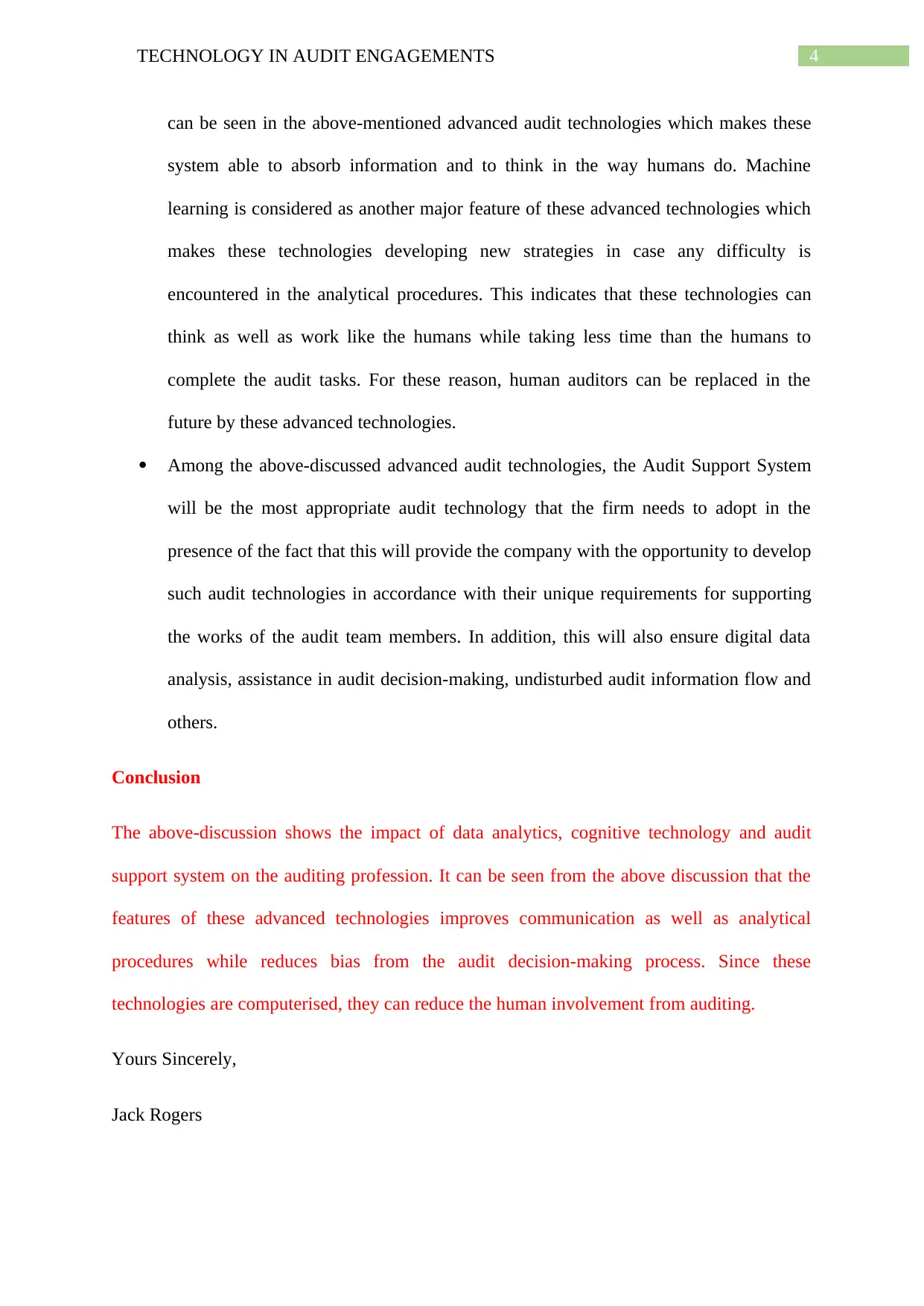
4TECHNOLOGY IN AUDIT ENGAGEMENTS
can be seen in the above-mentioned advanced audit technologies which makes these
system able to absorb information and to think in the way humans do. Machine
learning is considered as another major feature of these advanced technologies which
makes these technologies developing new strategies in case any difficulty is
encountered in the analytical procedures. This indicates that these technologies can
think as well as work like the humans while taking less time than the humans to
complete the audit tasks. For these reason, human auditors can be replaced in the
future by these advanced technologies.
Among the above-discussed advanced audit technologies, the Audit Support System
will be the most appropriate audit technology that the firm needs to adopt in the
presence of the fact that this will provide the company with the opportunity to develop
such audit technologies in accordance with their unique requirements for supporting
the works of the audit team members. In addition, this will also ensure digital data
analysis, assistance in audit decision-making, undisturbed audit information flow and
others.
Conclusion
The above-discussion shows the impact of data analytics, cognitive technology and audit
support system on the auditing profession. It can be seen from the above discussion that the
features of these advanced technologies improves communication as well as analytical
procedures while reduces bias from the audit decision-making process. Since these
technologies are computerised, they can reduce the human involvement from auditing.
Yours Sincerely,
Jack Rogers
can be seen in the above-mentioned advanced audit technologies which makes these
system able to absorb information and to think in the way humans do. Machine
learning is considered as another major feature of these advanced technologies which
makes these technologies developing new strategies in case any difficulty is
encountered in the analytical procedures. This indicates that these technologies can
think as well as work like the humans while taking less time than the humans to
complete the audit tasks. For these reason, human auditors can be replaced in the
future by these advanced technologies.
Among the above-discussed advanced audit technologies, the Audit Support System
will be the most appropriate audit technology that the firm needs to adopt in the
presence of the fact that this will provide the company with the opportunity to develop
such audit technologies in accordance with their unique requirements for supporting
the works of the audit team members. In addition, this will also ensure digital data
analysis, assistance in audit decision-making, undisturbed audit information flow and
others.
Conclusion
The above-discussion shows the impact of data analytics, cognitive technology and audit
support system on the auditing profession. It can be seen from the above discussion that the
features of these advanced technologies improves communication as well as analytical
procedures while reduces bias from the audit decision-making process. Since these
technologies are computerised, they can reduce the human involvement from auditing.
Yours Sincerely,
Jack Rogers
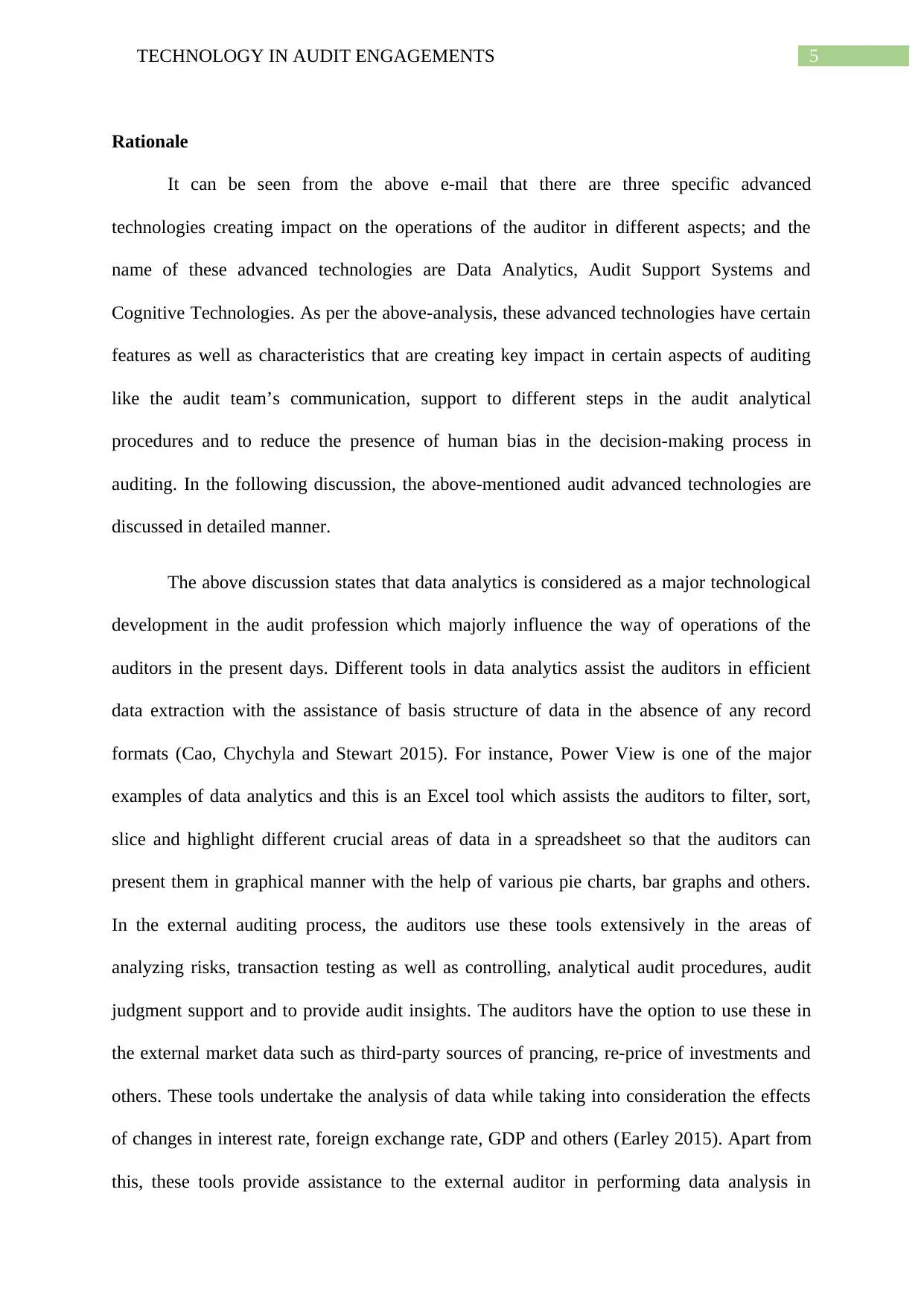
5TECHNOLOGY IN AUDIT ENGAGEMENTS
Rationale
It can be seen from the above e-mail that there are three specific advanced
technologies creating impact on the operations of the auditor in different aspects; and the
name of these advanced technologies are Data Analytics, Audit Support Systems and
Cognitive Technologies. As per the above-analysis, these advanced technologies have certain
features as well as characteristics that are creating key impact in certain aspects of auditing
like the audit team’s communication, support to different steps in the audit analytical
procedures and to reduce the presence of human bias in the decision-making process in
auditing. In the following discussion, the above-mentioned audit advanced technologies are
discussed in detailed manner.
The above discussion states that data analytics is considered as a major technological
development in the audit profession which majorly influence the way of operations of the
auditors in the present days. Different tools in data analytics assist the auditors in efficient
data extraction with the assistance of basis structure of data in the absence of any record
formats (Cao, Chychyla and Stewart 2015). For instance, Power View is one of the major
examples of data analytics and this is an Excel tool which assists the auditors to filter, sort,
slice and highlight different crucial areas of data in a spreadsheet so that the auditors can
present them in graphical manner with the help of various pie charts, bar graphs and others.
In the external auditing process, the auditors use these tools extensively in the areas of
analyzing risks, transaction testing as well as controlling, analytical audit procedures, audit
judgment support and to provide audit insights. The auditors have the option to use these in
the external market data such as third-party sources of prancing, re-price of investments and
others. These tools undertake the analysis of data while taking into consideration the effects
of changes in interest rate, foreign exchange rate, GDP and others (Earley 2015). Apart from
this, these tools provide assistance to the external auditor in performing data analysis in
Rationale
It can be seen from the above e-mail that there are three specific advanced
technologies creating impact on the operations of the auditor in different aspects; and the
name of these advanced technologies are Data Analytics, Audit Support Systems and
Cognitive Technologies. As per the above-analysis, these advanced technologies have certain
features as well as characteristics that are creating key impact in certain aspects of auditing
like the audit team’s communication, support to different steps in the audit analytical
procedures and to reduce the presence of human bias in the decision-making process in
auditing. In the following discussion, the above-mentioned audit advanced technologies are
discussed in detailed manner.
The above discussion states that data analytics is considered as a major technological
development in the audit profession which majorly influence the way of operations of the
auditors in the present days. Different tools in data analytics assist the auditors in efficient
data extraction with the assistance of basis structure of data in the absence of any record
formats (Cao, Chychyla and Stewart 2015). For instance, Power View is one of the major
examples of data analytics and this is an Excel tool which assists the auditors to filter, sort,
slice and highlight different crucial areas of data in a spreadsheet so that the auditors can
present them in graphical manner with the help of various pie charts, bar graphs and others.
In the external auditing process, the auditors use these tools extensively in the areas of
analyzing risks, transaction testing as well as controlling, analytical audit procedures, audit
judgment support and to provide audit insights. The auditors have the option to use these in
the external market data such as third-party sources of prancing, re-price of investments and
others. These tools undertake the analysis of data while taking into consideration the effects
of changes in interest rate, foreign exchange rate, GDP and others (Earley 2015). Apart from
this, these tools provide assistance to the external auditor in performing data analysis in
⊘ This is a preview!⊘
Do you want full access?
Subscribe today to unlock all pages.

Trusted by 1+ million students worldwide
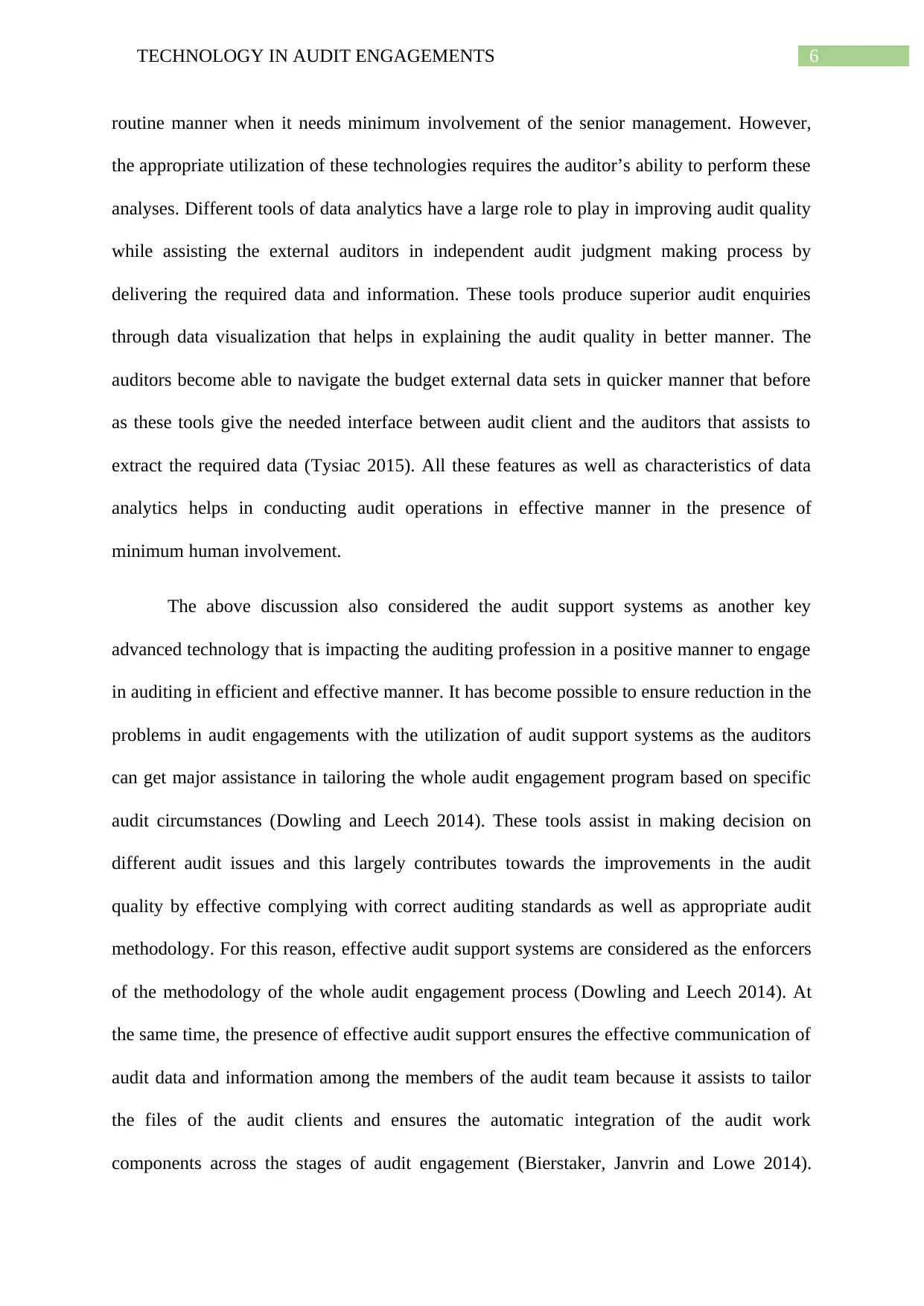
6TECHNOLOGY IN AUDIT ENGAGEMENTS
routine manner when it needs minimum involvement of the senior management. However,
the appropriate utilization of these technologies requires the auditor’s ability to perform these
analyses. Different tools of data analytics have a large role to play in improving audit quality
while assisting the external auditors in independent audit judgment making process by
delivering the required data and information. These tools produce superior audit enquiries
through data visualization that helps in explaining the audit quality in better manner. The
auditors become able to navigate the budget external data sets in quicker manner that before
as these tools give the needed interface between audit client and the auditors that assists to
extract the required data (Tysiac 2015). All these features as well as characteristics of data
analytics helps in conducting audit operations in effective manner in the presence of
minimum human involvement.
The above discussion also considered the audit support systems as another key
advanced technology that is impacting the auditing profession in a positive manner to engage
in auditing in efficient and effective manner. It has become possible to ensure reduction in the
problems in audit engagements with the utilization of audit support systems as the auditors
can get major assistance in tailoring the whole audit engagement program based on specific
audit circumstances (Dowling and Leech 2014). These tools assist in making decision on
different audit issues and this largely contributes towards the improvements in the audit
quality by effective complying with correct auditing standards as well as appropriate audit
methodology. For this reason, effective audit support systems are considered as the enforcers
of the methodology of the whole audit engagement process (Dowling and Leech 2014). At
the same time, the presence of effective audit support ensures the effective communication of
audit data and information among the members of the audit team because it assists to tailor
the files of the audit clients and ensures the automatic integration of the audit work
components across the stages of audit engagement (Bierstaker, Janvrin and Lowe 2014).
routine manner when it needs minimum involvement of the senior management. However,
the appropriate utilization of these technologies requires the auditor’s ability to perform these
analyses. Different tools of data analytics have a large role to play in improving audit quality
while assisting the external auditors in independent audit judgment making process by
delivering the required data and information. These tools produce superior audit enquiries
through data visualization that helps in explaining the audit quality in better manner. The
auditors become able to navigate the budget external data sets in quicker manner that before
as these tools give the needed interface between audit client and the auditors that assists to
extract the required data (Tysiac 2015). All these features as well as characteristics of data
analytics helps in conducting audit operations in effective manner in the presence of
minimum human involvement.
The above discussion also considered the audit support systems as another key
advanced technology that is impacting the auditing profession in a positive manner to engage
in auditing in efficient and effective manner. It has become possible to ensure reduction in the
problems in audit engagements with the utilization of audit support systems as the auditors
can get major assistance in tailoring the whole audit engagement program based on specific
audit circumstances (Dowling and Leech 2014). These tools assist in making decision on
different audit issues and this largely contributes towards the improvements in the audit
quality by effective complying with correct auditing standards as well as appropriate audit
methodology. For this reason, effective audit support systems are considered as the enforcers
of the methodology of the whole audit engagement process (Dowling and Leech 2014). At
the same time, the presence of effective audit support ensures the effective communication of
audit data and information among the members of the audit team because it assists to tailor
the files of the audit clients and ensures the automatic integration of the audit work
components across the stages of audit engagement (Bierstaker, Janvrin and Lowe 2014).
Paraphrase This Document
Need a fresh take? Get an instant paraphrase of this document with our AI Paraphraser
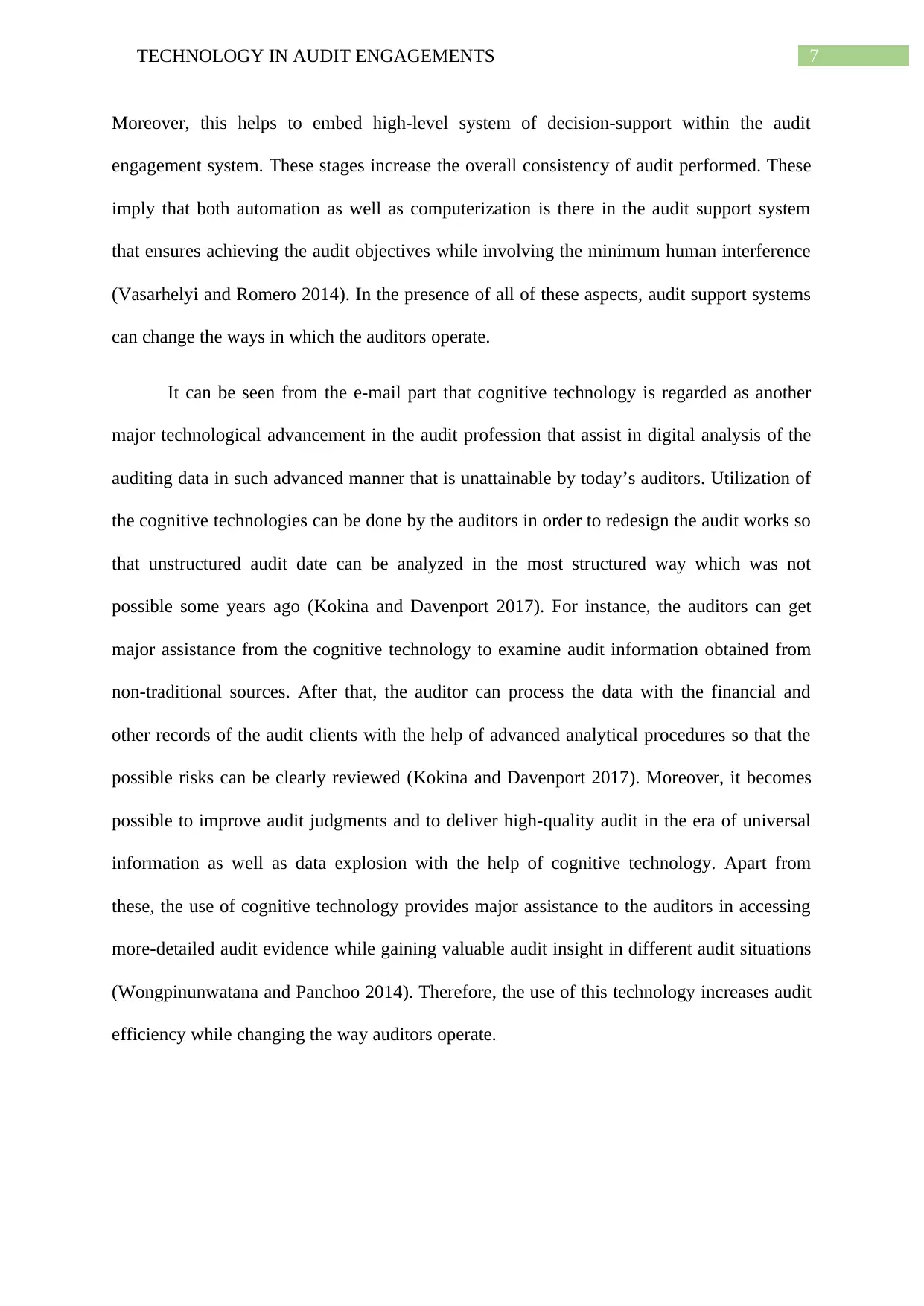
7TECHNOLOGY IN AUDIT ENGAGEMENTS
Moreover, this helps to embed high-level system of decision-support within the audit
engagement system. These stages increase the overall consistency of audit performed. These
imply that both automation as well as computerization is there in the audit support system
that ensures achieving the audit objectives while involving the minimum human interference
(Vasarhelyi and Romero 2014). In the presence of all of these aspects, audit support systems
can change the ways in which the auditors operate.
It can be seen from the e-mail part that cognitive technology is regarded as another
major technological advancement in the audit profession that assist in digital analysis of the
auditing data in such advanced manner that is unattainable by today’s auditors. Utilization of
the cognitive technologies can be done by the auditors in order to redesign the audit works so
that unstructured audit date can be analyzed in the most structured way which was not
possible some years ago (Kokina and Davenport 2017). For instance, the auditors can get
major assistance from the cognitive technology to examine audit information obtained from
non-traditional sources. After that, the auditor can process the data with the financial and
other records of the audit clients with the help of advanced analytical procedures so that the
possible risks can be clearly reviewed (Kokina and Davenport 2017). Moreover, it becomes
possible to improve audit judgments and to deliver high-quality audit in the era of universal
information as well as data explosion with the help of cognitive technology. Apart from
these, the use of cognitive technology provides major assistance to the auditors in accessing
more-detailed audit evidence while gaining valuable audit insight in different audit situations
(Wongpinunwatana and Panchoo 2014). Therefore, the use of this technology increases audit
efficiency while changing the way auditors operate.
Moreover, this helps to embed high-level system of decision-support within the audit
engagement system. These stages increase the overall consistency of audit performed. These
imply that both automation as well as computerization is there in the audit support system
that ensures achieving the audit objectives while involving the minimum human interference
(Vasarhelyi and Romero 2014). In the presence of all of these aspects, audit support systems
can change the ways in which the auditors operate.
It can be seen from the e-mail part that cognitive technology is regarded as another
major technological advancement in the audit profession that assist in digital analysis of the
auditing data in such advanced manner that is unattainable by today’s auditors. Utilization of
the cognitive technologies can be done by the auditors in order to redesign the audit works so
that unstructured audit date can be analyzed in the most structured way which was not
possible some years ago (Kokina and Davenport 2017). For instance, the auditors can get
major assistance from the cognitive technology to examine audit information obtained from
non-traditional sources. After that, the auditor can process the data with the financial and
other records of the audit clients with the help of advanced analytical procedures so that the
possible risks can be clearly reviewed (Kokina and Davenport 2017). Moreover, it becomes
possible to improve audit judgments and to deliver high-quality audit in the era of universal
information as well as data explosion with the help of cognitive technology. Apart from
these, the use of cognitive technology provides major assistance to the auditors in accessing
more-detailed audit evidence while gaining valuable audit insight in different audit situations
(Wongpinunwatana and Panchoo 2014). Therefore, the use of this technology increases audit
efficiency while changing the way auditors operate.
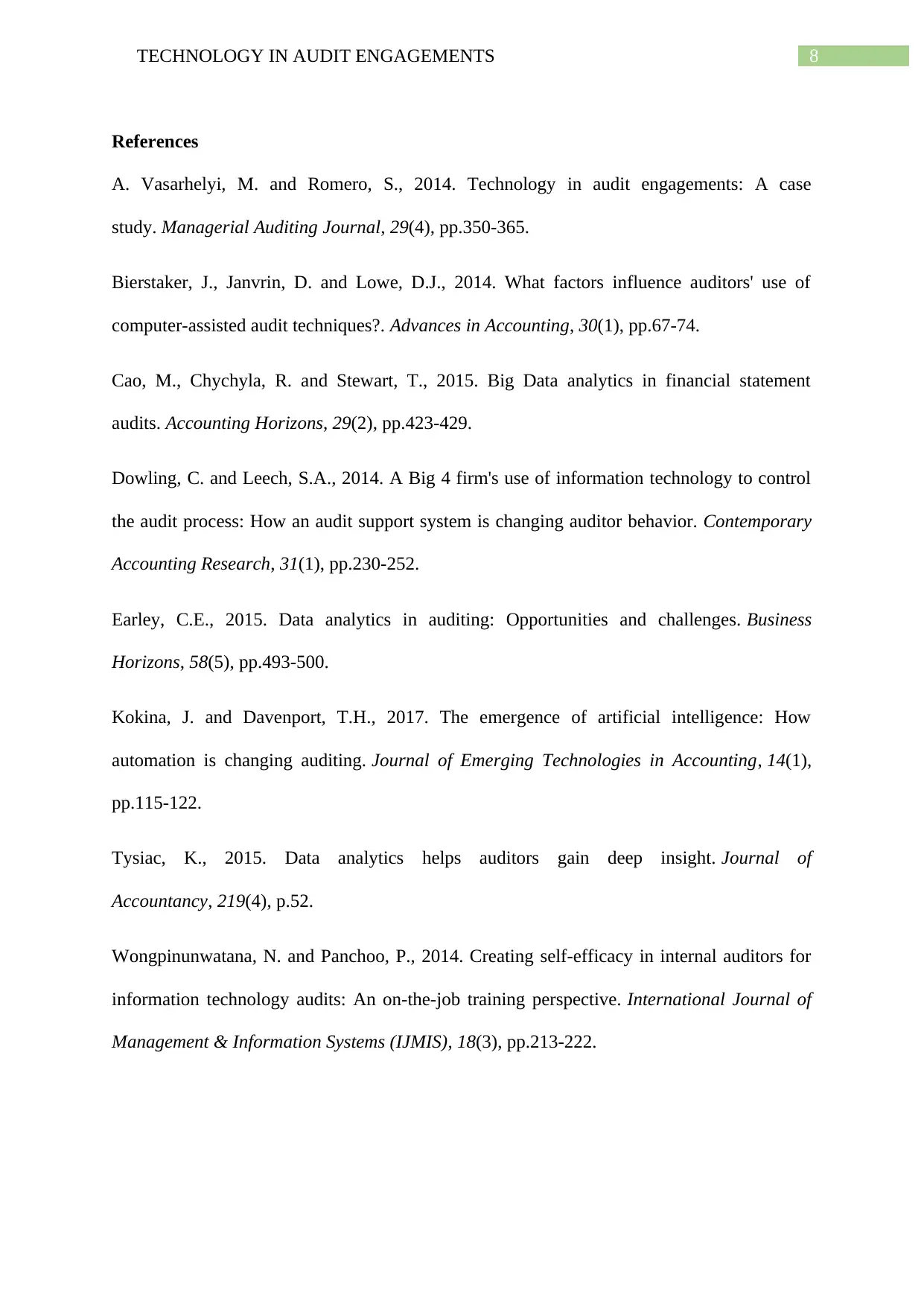
8TECHNOLOGY IN AUDIT ENGAGEMENTS
References
A. Vasarhelyi, M. and Romero, S., 2014. Technology in audit engagements: A case
study. Managerial Auditing Journal, 29(4), pp.350-365.
Bierstaker, J., Janvrin, D. and Lowe, D.J., 2014. What factors influence auditors' use of
computer-assisted audit techniques?. Advances in Accounting, 30(1), pp.67-74.
Cao, M., Chychyla, R. and Stewart, T., 2015. Big Data analytics in financial statement
audits. Accounting Horizons, 29(2), pp.423-429.
Dowling, C. and Leech, S.A., 2014. A Big 4 firm's use of information technology to control
the audit process: How an audit support system is changing auditor behavior. Contemporary
Accounting Research, 31(1), pp.230-252.
Earley, C.E., 2015. Data analytics in auditing: Opportunities and challenges. Business
Horizons, 58(5), pp.493-500.
Kokina, J. and Davenport, T.H., 2017. The emergence of artificial intelligence: How
automation is changing auditing. Journal of Emerging Technologies in Accounting, 14(1),
pp.115-122.
Tysiac, K., 2015. Data analytics helps auditors gain deep insight. Journal of
Accountancy, 219(4), p.52.
Wongpinunwatana, N. and Panchoo, P., 2014. Creating self-efficacy in internal auditors for
information technology audits: An on-the-job training perspective. International Journal of
Management & Information Systems (IJMIS), 18(3), pp.213-222.
References
A. Vasarhelyi, M. and Romero, S., 2014. Technology in audit engagements: A case
study. Managerial Auditing Journal, 29(4), pp.350-365.
Bierstaker, J., Janvrin, D. and Lowe, D.J., 2014. What factors influence auditors' use of
computer-assisted audit techniques?. Advances in Accounting, 30(1), pp.67-74.
Cao, M., Chychyla, R. and Stewart, T., 2015. Big Data analytics in financial statement
audits. Accounting Horizons, 29(2), pp.423-429.
Dowling, C. and Leech, S.A., 2014. A Big 4 firm's use of information technology to control
the audit process: How an audit support system is changing auditor behavior. Contemporary
Accounting Research, 31(1), pp.230-252.
Earley, C.E., 2015. Data analytics in auditing: Opportunities and challenges. Business
Horizons, 58(5), pp.493-500.
Kokina, J. and Davenport, T.H., 2017. The emergence of artificial intelligence: How
automation is changing auditing. Journal of Emerging Technologies in Accounting, 14(1),
pp.115-122.
Tysiac, K., 2015. Data analytics helps auditors gain deep insight. Journal of
Accountancy, 219(4), p.52.
Wongpinunwatana, N. and Panchoo, P., 2014. Creating self-efficacy in internal auditors for
information technology audits: An on-the-job training perspective. International Journal of
Management & Information Systems (IJMIS), 18(3), pp.213-222.
⊘ This is a preview!⊘
Do you want full access?
Subscribe today to unlock all pages.

Trusted by 1+ million students worldwide
1 out of 9
Related Documents
Your All-in-One AI-Powered Toolkit for Academic Success.
+13062052269
info@desklib.com
Available 24*7 on WhatsApp / Email
![[object Object]](/_next/static/media/star-bottom.7253800d.svg)
Unlock your academic potential
Copyright © 2020–2026 A2Z Services. All Rights Reserved. Developed and managed by ZUCOL.





